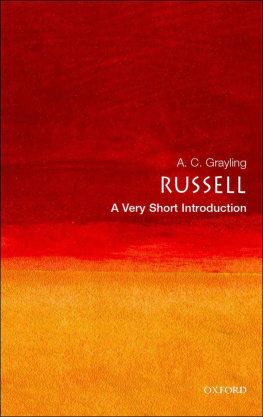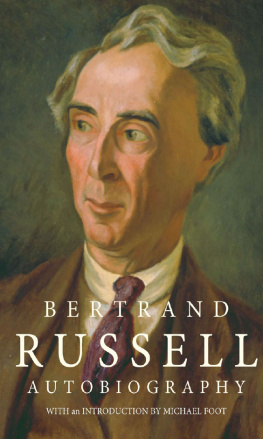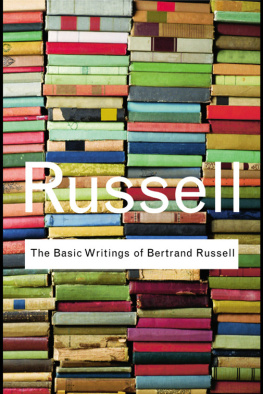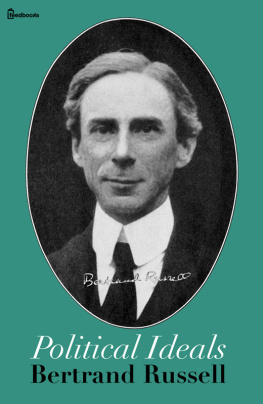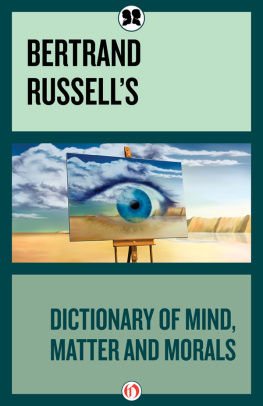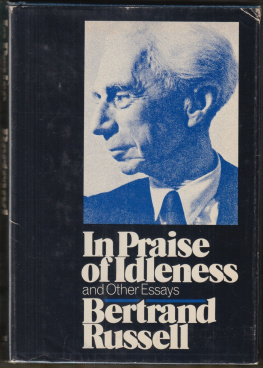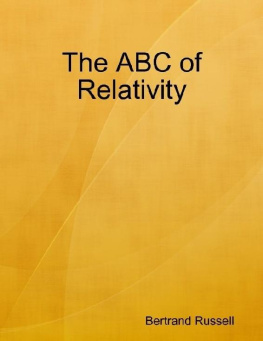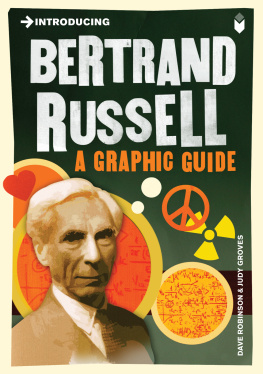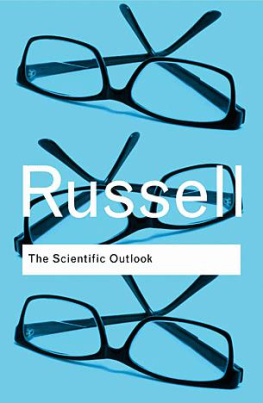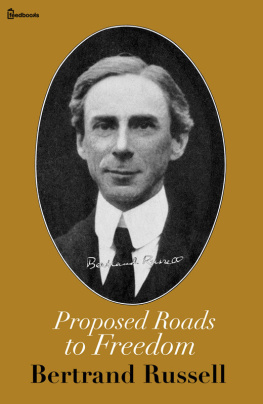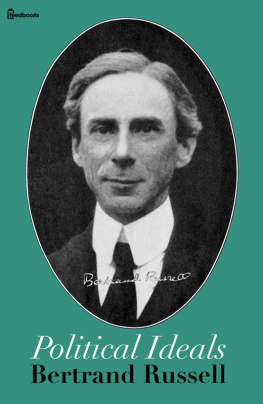Russell Bertrand - Political Ideals
Here you can read online Russell Bertrand - Political Ideals full text of the book (entire story) in english for free. Download pdf and epub, get meaning, cover and reviews about this ebook. genre: Science. Description of the work, (preface) as well as reviews are available. Best literature library LitArk.com created for fans of good reading and offers a wide selection of genres:
Romance novel
Science fiction
Adventure
Detective
Science
History
Home and family
Prose
Art
Politics
Computer
Non-fiction
Religion
Business
Children
Humor
Choose a favorite category and find really read worthwhile books. Enjoy immersion in the world of imagination, feel the emotions of the characters or learn something new for yourself, make an fascinating discovery.
- Book:Political Ideals
- Author:
- Genre:
- Rating:4 / 5
- Favourites:Add to favourites
- Your mark:
- 80
- 1
- 2
- 3
- 4
- 5
Political Ideals: summary, description and annotation
We offer to read an annotation, description, summary or preface (depends on what the author of the book "Political Ideals" wrote himself). If you haven't found the necessary information about the book — write in the comments, we will try to find it.
Political Ideals — read online for free the complete book (whole text) full work
Below is the text of the book, divided by pages. System saving the place of the last page read, allows you to conveniently read the book "Political Ideals" online for free, without having to search again every time where you left off. Put a bookmark, and you can go to the page where you finished reading at any time.
Font size:
Interval:
Bookmark:
The Project Gutenberg EBook of Political Ideals, by Bertrand Russell
This eBook is for the use of anyone anywhere at no cost and with
almost no restrictions whatsoever. You may copy it, give it away or
re-use it under the terms of the Project Gutenberg License included
with this eBook or online at www.gutenberg.net
Title: Political Ideals
Author: Bertrand Russell
Posting Date: September 4, 2009 [EBook #4776]
Release Date: December, 2003
First Posted: March 17, 2002
Language: English
*** START OF THIS PROJECT GUTENBERG EBOOK POLITICAL IDEALS ***
Produced by Gordon Keener.
| I: | Political Ideals |
| II: | Capitalism and the Wage System |
| III: | Pitfalls in Socialism |
| IV: | Individual Liberty and Public Control |
| V: | National Independence and Internationalism |
In dark days, men need a clear faith and a well-grounded hope; and as the outcome of these, the calm courage which takes no account of hardships by the way. The times through which we are passing have afforded to many of us a confirmation of our faith. We see that the things we had thought evil are really evil, and we know more definitely than we ever did before the directions in which men must move if a better world is to arise on the ruins of the one which is now hurling itself into destruction. We see that men's political dealings with one another are based on wholly wrong ideals, and can only be saved by quite different ideals from continuing to be a source of suffering, devastation, and sin.
Political ideals must be based upon ideals for the individual life. The aim of politics should be to make the lives of individuals as good as possible. There is nothing for the politician to consider outside or above the various men, women, and children who compose the world. The problem of politics is to adjust the relations of human beings in such a way that each severally may have as much of good in his existence as possible. And this problem requires that we should first consider what it is that we think good in the individual life.
To begin with, we do not want all men to be alike. We do not want to lay down a pattern or type to which men of all sorts are to be made by some means or another to approximate. This is the ideal of the impatient administrator. A bad teacher will aim at imposing his opinion, and turning out a set of pupils all of whom will give the same definite answer on a doubtful point. Mr. Bernard Shaw is said to hold that Troilus and Cressida is the best of Shakespeare's plays. Although I disagree with this opinion, I should welcome it in a pupil as a sign of individuality; but most teachers would not tolerate such a heterodox view. Not only teachers, but all commonplace persons in authority, desire in their subordinates that kind of uniformity which makes their actions easily predictable and never inconvenient. The result is that they crush initiative and individuality when they can, and when they cannot, they quarrel with it.
It is not one ideal for all men, but a separate ideal for each separate man, that has to be realized if possible. Every man has it in his being to develop into something good or bad: there is a best possible for him, and a worst possible. His circumstances will determine whether his capacities for good are developed or crushed, and whether his bad impulses are strengthened or gradually diverted into better channels.
But although we cannot set up in any detail an ideal of character which is to be universally applicablealthough we cannot say, for instance, that all men ought to be industrious, or self-sacrificing, or fond of musicthere are some broad principles which can be used to guide our estimates as to what is possible or desirable.
We may distinguish two sorts of goods, and two corresponding sorts of impulses. There are goods in regard to which individual possession is possible, and there are goods in which all can share alike. The food and clothing of one man is not the food and clothing of another; if the supply is insufficient, what one man has is obtained at the expense of some other man. This applies to material goods generally, and therefore to the greater part of the present economic life of the world. On the other hand, mental and spiritual goods do not belong to one man to the exclusion of another. If one man knows a science, that does not prevent others from knowing it; on the contrary, it helps them to acquire the knowledge. If one man is a great artist or poet, that does not prevent others from painting pictures or writing poems, but helps to create the atmosphere in which such things are possible. If one man is full of good-will toward others, that does not mean that there is less good-will to be shared among the rest; the more good-will one man has, the more he is likely to create among others. In such matters there is no possession, because there is not a definite amount to be shared; any increase anywhere tends to produce an increase everywhere.
There are two kinds of impulses, corresponding to the two kinds of goods. There are possessive impulses, which aim at acquiring or retaining private goods that cannot be shared; these center in the impulse of property. And there are creative or constructive impulses, which aim at bringing into the world or making available for use the kind of goods in which there is no privacy and no possession.
The best life is the one in which the creative impulses play the largest part and the possessive impulses the smallest. This is no new discovery. The Gospel says: "Take no thought, saying, What shall we eat? or What shall we drink? or, Wherewithal shall we be clothed?" The thought we give to these things is taken away from matters of more importance. And what is worse, the habit of mind engendered by thinking of these things is a bad one; it leads to competition, envy, domination, cruelty, and almost all the moral evils that infest the world. In particular, it leads to the predatory use of force. Material possessions can be taken by force and enjoyed by the robber. Spiritual possessions cannot be taken in this way. You may kill an artist or a thinker, but you cannot acquire his art or his thought. You may put a man to death because he loves his fellow-men, but you will not by so doing acquire the love which made his happiness. Force is impotent in such matters; it is only as regards material goods that it is effective. For this reason the men who believe in force are the men whose thoughts and desires are preoccupied with material goods.
The possessive impulses, when they are strong, infect activities which ought to be purely creative. A man who has made some valuable discovery may be filled with jealousy of a rival discoverer. If one man has found a cure for cancer and another has found a cure for consumption, one of them may be delighted if the other man's discovery turns out a mistake, instead of regretting the suffering of patients which would otherwise have been avoided. In such cases, instead of desiring knowledge for its own sake, or for the sake of its usefulness, a man is desiring it as a means to reputation. Every creative impulse is shadowed by a possessive impulse; even the aspirant to saintliness may be jealous of the more successful saint. Most affection is accompanied by some tinge of jealousy, which is a possessive impulse intruding into the creative region. Worst of all, in this direction, is the sheer envy of those who have missed everything worth having in life, and who are instinctively bent on preventing others from enjoying what they have not had. There is often much of this in the attitude of the old toward the young.
Font size:
Interval:
Bookmark:
Similar books «Political Ideals»
Look at similar books to Political Ideals. We have selected literature similar in name and meaning in the hope of providing readers with more options to find new, interesting, not yet read works.
Discussion, reviews of the book Political Ideals and just readers' own opinions. Leave your comments, write what you think about the work, its meaning or the main characters. Specify what exactly you liked and what you didn't like, and why you think so.




